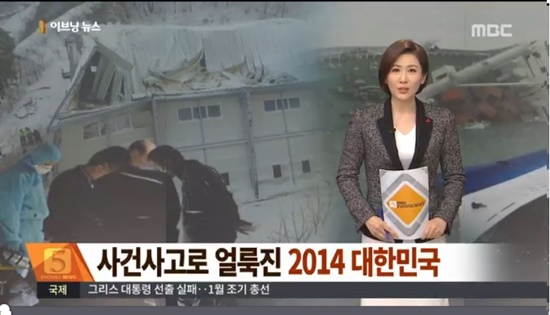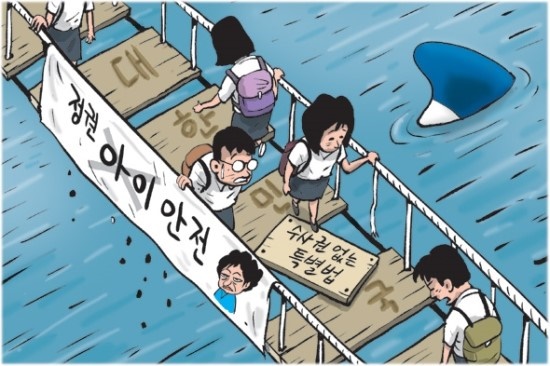|
It is not too much to say that 2014 was an eventful year. There were plenty of incidents and difficulties last year, however it could also be seen as a year when our government wasted time not protecting its people. It seemed like a lot of small accidents continued to occur after the ‘Kyeongju Mauna resort’ accident and the ‘Sewol ferry’ disaster. What could be the reason why accidents continue to occur? We can review our safety practices and learn from those incidents. I think they were partly the result of our indifference to safety. We should examine the social atmosphere as well as our attitudes because these accidents were not the fault of any individuals, but rather because of all of us. So I want you to reflect on the year 2014 and ask if we are currently living safely in Korea. If we aren’t, what made us to be so unsafe. Why don’t we repair our broken clock?
 |
Safety, Where are you from?
In the dictionary, ‘safety’ means that there will be no danger or accidents. This 'safety state’ means that there are no existing factors of danger or even if they do exist, verifiable measures are in place so that people don’t get hurt. However, we can’t actually call safety a state in which any accident or disaster does not occur. Rather, safety means that emergency measures are set up based on the predictable potential of danger. We make safety. That is, safety exists only when we always have a sense of it. A sense of safety shows the extent that our consciousness of safety is revealed through our specific behaviors and practices. According to a recent news article, the safety clock of KOREA has been stopped since 1994. ‘The collapse of Sungsoo bridge’, an extremely shocking incident, occurred because the government didn’t take any action for a year despite reports of the possibility of Sungsoo bridge collapsing. Nothing has changed for the past 20 years. We can be certain of it through ‘The collapse of the Gyeongju Mauna resort’ in 2014. In both cases of the collapse of Sungsoo bridge and the collapse of Gyeongju Mauna resort, the disastrous incidents occurred because people knew about the potential danger but neglected to handle them properly or safely. The hardware for safety has been upgraded but the government, business operators and citizens' sense of safety, which can be compared to software, are still as backward as they were twenty years ago.
 |
Can you believe it?
Do you believe that Korea, the society you are living in right now, is safe? <The accident that shook the year of 2014>, as broadcast on MBC's evening news showed a public survey implemented by the Ministry of Public Safety and Security. The survey showed that during the second half of last year, only 21% of people – that’s one in five people! – answered ‘safe’ to the question; “Do you think our society is safe?" That is a 2% decreased compared to the year before and the first half of last year. Approximately eight in ten people think their society is not safe! As the number of incidents increase, people’s sense of safety is naturally decreasing. It is a pity that people can’t even trust their own nation. I think that the relationship between a nation and its citizens is just as important as the ‘trust’ and ‘belief’ between its people. How can we convince citizens to believe in their government?
Hoping for more than just ending the pain…
The year of 2014 was very painful for all of us, not only for the victims’ family but also for the people watching. When we see a devastating incident resulting in people dying or getting hurt, we are heartbroken. But we should not let it end with the pain of an aching heart. We need to think about the causes of the incident and plan for the possibility of future accidents. Otherwise, we have no choice but to see it re-occur, again and again. So I want to look into the main accidents of 2014.
 |
- Sewol Ferry incident, which made Korean citizens cry out in sorrow.
On April 16, 2014, while carrying 475 passengers on the way to Jeju island from Incheon, the Sewol Ferry sank. Only 172 people were rescued and roughly 300 people died or disappeared. Most of the passengers were Danwon high school students and the rate of rescue was merely twenty-three percent. Many causes of this disaster have been mentioned; unreasonable departure time, cargo loading, and ship renovations are said to be main reasons. In particular, the weather on that day was terrible so many ships gave up on their departure, but the Sewol Ferry pushed ahead with departure. Overloaded cargo is also presumed to be one of the main causes because when the ferry did sudden veering it lost its ability to restore its balance. It was also suspected that in order to cut costs and save time, the cargo wasn't properly fastened. Then there is the dereliction of duty by the Jindo VTS and the wasting of golden time. The Jindo VTS didn’t notice the entry of the Sewol ferry into their jurisdiction and therefore wasted initial reaction time. The maritime police added to the damages because they didn’t fully enter the water and only performed passive rescues. The most shocking thing was the captain’s behavior. He was the first to escape from the sinking ship, leaving the passengers behind. Also, other sailors repeatedly told the passengers to stay whey they were. In short, the improper initial reaction and late rescue caused a great deal of damage and loss of human life.
 |
- The collapse of Pangyo ventilation window, opening eyes for safety.
On October 17, 2014, twenty seven people fell into a ventilation window while watching a live outdoor performance at Pangyo, near Pankyo Techno Valley. The ventilation window couldn't endure the heavy weight of the people and collapsed. In this incident, 27 people fell approximately 20 metres, resulting in 16 people dying and 11 people injured. According to a survey, the ventilation window could only endure a weight of 700kg, or about 8.5 people. Some people criticized the security guards’ actions. The next day, the person who was in charge of safety at the Pangyo festival was found dead. Ventilation windows were always something people saw as ordinary, something that seemed safe to walk on. But after this incident, some places put up signs saying, ‘Watch your step’. It was an incident that led us to reflect on our insensible behavior.
We broke it.
The safety clock of KOREA was broken. Who broke it? We did. Our ignorance and frigidity about safety is one of the important causes of accidents. There are many causes but I want to focus on people’s sense of safety and their unwillingness to change. If you had little knowledge of safety, you would be embarrassed when faced with a dangerous situation. It’s natural that you wouldn’t know what to do in certain situations. People should be filled with knowledge before acting out. Safety frigidity means no sense of safety. It is said to be the inattentiveness to safety. When most people have this attitude, the whole society tends to be indifferent to safety, and this doesn’t easily change. Most accidents are caused by people. People get hurt by people. The safety clock has broken.
Let’s repair!
We broke the safety clock, so we should repair it. In order to change people’s consciousness of safety and the social atmosphere, both the government and each of us need to make an effort. The government should reorganize the national safety management system. According to a review, there are no shortcuts to reorganizing safety. We have to check all things one by one. In 2014, there were a lot of incidents, particularly in public facilities. To prevent similar incidents, we must check all facilities. If a problem comes up while facilities are being checked, the government must take actions and solve it instantly and reinforce safety standards. Also, they should cooperate with experts and prepare practical incident response guidelines. As mentioned before, each of us should change our consciousness on safety. I put an emphasis on it repeatedly because the main reason for terrible accidents is our ignorance of safety and our easy-going thinking that we might not be in a danger. You shouldn’t neglect safety education. There will be a huge difference between those who have received safety education and those who have not. The government should provide people with safety education as a necessity so that all people get proper knowledge of safety, and people need to take part in this education with sincerity.
A year has already gone by and a new year has come to us. But Korea still isn't safe. As the year of 2014 with continuous incidents is left in the past, we hope for a safe year in 2015. However, accidents are still occurring. Even though it is hard to repair the safety clock in a short amount of time, it is never impossible. Like the quote, "I should change first, not wishing for others to change", and "The world will change as long as I do." We should never put off safety. Above all, we shouldn’t forget about the past. Self-reflecting is mandatory for self-development. As a citizen, we can look back on the past year and make our society safer. Let's expect a better and brighter future.
 |
< Copyright © The Gachon Herald All rights reserved > |
